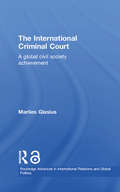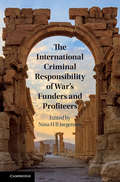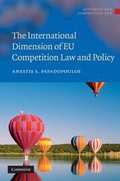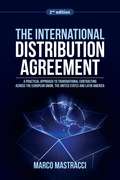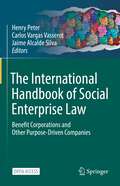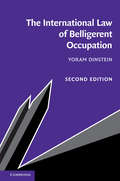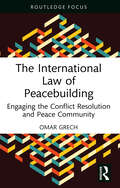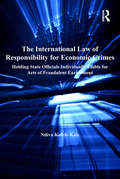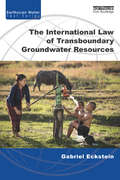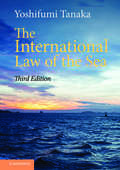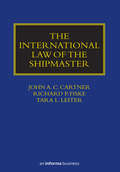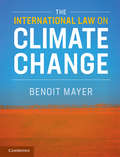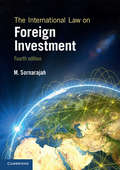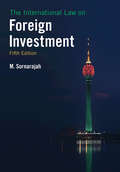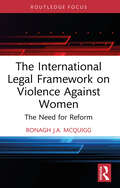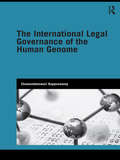- Table View
- List View
The International Criminal Court: A Global Civil Society Achievement (Routledge Advances in International Relations and Global Politics #Vol. 39)
by Marlies GlasiusA new examination of the International Criminal Court (ICC) from a political science and international relations perspective. It describes the main features of the court and discusses the political negotiations and the on-going clashes between those states who oppose the court, particularly the United States, and those who defend it. It also makes these issues accessible to non-lawyers and presents effective advocacy strategies for non-governmental organizations. It also delivers essential background to the place of the US in international relations and makes a major contribution to thinking about the ICC’s future. While global civil society does not deliver global democracy, it does contribute to more transparent, more deliberative and more ethical international decision-making which is ultimately preferable to a world of isolated sovereign states with no accountability outside their borders, or exclusive and secretive state-to-state diplomacy. This book will be of great interest to students and scholars of international relations, international law, globalization and global governance.
The International Criminal Responsibility of War's Funders and Profiteers
by Jørgensen, Nina H. B.This book is concerned with the commercial exploitation of armed conflict; it is about money, war, atrocities and economic actors, about the connections between them, and about responsibility. It aims to clarify the legal framework that defines these connections and gives rise to criminal or, in some instances, civil responsibility, referring both to mechanisms for international criminal justice, such as the International Criminal Court, and domestic systems. It considers which economic actors among individuals, businesses, governments and States should be held accountable and before which forum. Additionally, it addresses the question of how to recover illegally acquired profits and redirect them to benefit the victims of war. The chapters shine a critical light on the options provided by a network of laws to ensure that the 'great industrialists' of our time, who find economic opportunities in the war-ravaged lives of others, are unable to pursue those opportunities with impunity.
The International Dimension of EU Competition Law and Policy
by Anestis S. PapadopoulosModern competition law was first employed by countries over one hundred years ago in order to address issues relating to restrictions of trade at the national level. Recent international economic integration has weakened the distinction between the domestic and the international in several fields of economic activity, and consequently the laws which regulate such activity, competition law included. Several attempts to address the paradox of adopting national competition rules to address international issues have been made at the international, regional and (lately) bilateral levels. This book discusses the international dimension of EU competition law, and examines the position taken by the EU in four distinct categories of international agreements which are devoted to competition or include competition provisions. In particular, it analyses the EU's position with regard to bilateral enforcement cooperation agreements, bilateral free trade agreements, plurilateral-regional agreements and the long negotiations for the adoption of a multilateral competition regime.
The International Distribution Agreement: A Practical Approach to Transnational Contracting across the European Union, the United States and Latin America (2nd edition)
by Marco MastracciWith the ever-increasing interconnection between markets, businesses and individuals from all over the globe, professionals are asked to develop a greater interest in the international implications of contracts. This book focuses attention on the distribu
The International Distribution of News
by Jonathan Silberstein-LoebBased on newly available and extensive archival evidence, this book traces the history of international news agencies and associations around the world from 1848 to 1947. Jonathan Silberstein-Loeb argues that newspaper publishers formed news associations and patronized news agencies to cut the costs of news collection and exclude competitors from gaining access to the news. In this way, cooperation facilitated the distribution of news. The extent to which state regulation permitted cooperation, or prohibited exclusivity, determined the benefit newspaper publishers derived from these organizations. This book revises our understanding of the operation and organization of the Associated Press, the BBC, the Press Association, Reuters, and the United Press. It also sheds light on the history of competition policy respecting the press, intellectual property, and the regulation of telecommunications.
The International Handbook of Social Enterprise Law: Benefit Corporations and Other Purpose-Driven Companies
by Henry Peter Carlos Vargas Vasserot Jaime Alcalde SilvaThis open-access book brings together international experts who shed new light on the status of social enterprises, benefit corporations and other purpose-driven companies. The respective chapters take a multidisciplinary approach (combining law, philosophy, history, sociology and economics) and provide valuable insights on fostering social entrepreneurship and advancing the common good.In recent years, we have witnessed a significant shift of how business activities are conducted, mainly through the rise of social enterprises. In an effort to target social problems at their roots, social entrepreneurs create organizations that bring transformative social changes by considering, among others, ethical, social, and environmental factors. A variety of social enterprise models are emerging internationally and are proving their vitality and importance.But what does the term “social enterprise” mean? What are its roots? And how does it work in practice within the legal framework of any country? This handbook attempts to answer these questions from a theoretical, historical, and comparative perspective, bringing together 44 contributions written by 71 expert researchers and practitioners in this field. The first part provides an overview of the social enterprise movement, its evolution, and the different forms entities can take to meet global challenges, overcoming the limits of what governments and states can do. The second part focuses on the emergence of benefit corporations and the growing importance of sustainability and societal values, while also analyzing their different legal forms and adaptation to their regulatory environment. In turn, the last part presents the status quo of purpose-driven companies in 36 developed and emerging economies worldwide.This handbook offers food for thought and guidance for everyone interested in this field. It will benefit practitioners and decision-makers involved in social and community organizations, as well as in international development and, more generally speaking, social sciences and economics.
The International Law of Belligerent Occupation
by Yoram DinsteinBelligerent occupations existed in both World Wars and have occurred more recently in all parts of the world (including Iraq, Afghanistan, the former Yugoslavia, Congo, Northern Cyprus, Nagorno-Karabakh, Georgia, Eritrea and Ethiopia). Owing to its special length – exceeding half a century and still in progress – and the unprecedented flow of judicial decisions, a special focus is called for as regards to the occupation of Palestinian territories by Israel. International law addresses the subject of belligerent occupation in some detail. This second, revised edition updates the text (originally published in 2009) in terms of both State practice and doctrinal discourse. The emphasis is put on decisions of the Security Council; legislation adopted by the Coalition Provisional Authority in Iraq; and predominantly case law: international (Judgments of the International Court of Justice, the International Criminal Tribunal for the Former Yugoslavia and the European Court of Human Rights; Advisory Opinions and Arbitral Awards) as well as domestic courts.
The International Law of Disaster Relief
by Michael J. Kelly David D. Caron Michael J. Kelly Anastasia Telesetsky David D. CaronDisasters can strike often and with unexpected fury, resulting in devastating consequences for local populations that are insufficiently prepared and largely dependent upon foreign aid in the wake of such catastrophes. International law can play a significant role in the recovery after inevitable natural disasters; however, without clear legal frameworks, aid may be stopped, delayed, or even hijacked - placing the intended suffering recipients in critical condition. This edited volume brings together experts, emerging scholars, and practitioners in the field of international disaster law from North America, Japan, New Zealand, and Australia to analyze the evolution of international disaster law as a field that encompasses new ideas about human rights, sovereignty, and technology. Chapters focus on specific natural disasters like Hurricane Katrina, Cyclone Nargis, and Typhoon Hainan in addition to volcanic and earthquake activity, wildfires, and desertification. This book begins a dialogue on the profound implications of the evolution of international law as a tool for disaster response.
The International Law of Economic Warfare (European Yearbook of International Economic Law #16)
by Teoman M. Hagemeyer-WitzlebSince the prohibition of the threat or use of force and the resurgence of (economic) nationalism, economic warfare has become an increasingly important substitute for actual hostilities between states. Its manifestations range from medieval sieges to modern day trade wars. Despite its long history, economic warfare remains an elusive term, foreign to international law. This book seeks to identify those portions of international law that are applicable to economic warfare. What is the status quo of regulation? Is there a jus ad bellum oeconomicum? A jus in bello oeconomico? After putting forward its own definition of economic warfare, the book reviews historical case studies – reflecting the three main branches of international economic law: trade, investment and currency – to identify pertinent legal boundaries. While the case studies reveal that numerous rules of international (economic) law regulate (specific measures of) economic warfare, it remains to be seen whether – analogously to the prohibition of the threat or use of force – these selective limitations have the potential to coalesce into a general prohibition of economic warfare in the future.
The International Law of Energy (Cambridge Studies in International and Comparative Law #164)
by Jorge ViñualesThe world's energy structure underpins the global environmental crisis and changing it will require regulatory change at a massive level. Energy is highly regulated in international law, but the field has never been comprehensively mapped. The legal sources on which the governance of energy is based are plentiful but they are scattered across a vast legal expanse. This book is the first single-authored study of the international law of energy as a whole. Written by a world-leading expert, it provides a comprehensive account of the international law of energy and analyses the implications of the ongoing energy transformation for international law. The study combines conceptual and doctrinal analysis of all the main rules, processes and institutions to consider the past, present and likely future of global energy governance. Providing a solid foundation for teaching, research and practice, this book addresses both the theory and real-world policy dimension of the international law of energy.
The International Law of Investment Claims
by Zachary DouglasThis book was first published in 2009. The International Law of Investment Claims considers the distinct principles governing the prosecution of a claim in investment treaty arbitration. The principles are codified as 54 'rules' of general application on the juridical foundations of investment treaty arbitration, the jurisdiction of the tribunal, the admissibility of claims and the laws applicable to different aspects of the investment dispute. The commentary to each proposed rule contains a critical analysis of the investment treaty jurisprudence and makes extensive reference to the decisions of other international courts and tribunals, as well as to the relevant experience of municipal legal orders. Solutions are elaborated in respect of the most intractable problems that have arisen in the cases, including: the effect of an exclusive jurisdiction clause in an investment agreement with the host state; reliance on the MFN clause in relation to jurisdictional provisions; and, the legitimate scope of derivative claims by shareholders.
The International Law of Migrant Smuggling
by Anne T. Gallagher AO Fiona DavidWhether forced into relocation by fear of persecution, civil war, or humanitarian crisis, or pulled toward the prospect of better economic opportunities, more people are on the move than ever before. Opportunities for lawful entry into preferred destinations are decreasing rapidly, creating demand for a range of services that is increasingly being met by migrant smugglers: individuals or criminal groups who facilitate unauthorized entry into in another country for profit. This book, a companion volume to the award-winning The International Law of Human Trafficking, presents the first-ever comprehensive and in-depth analysis of the international law of migrant smuggling. The authors call on their direct experience of working with the United Nations to chart the development of new international laws and to link these specialist rules to other relevant areas of international law, including law of the sea, human rights law, and international refugee law. Through this analysis, the authors identify and explain the major legal obligations of States with respect to migrant smuggling, including those related to criminalization, interdiction and rescue at sea, protection, prevention, detention, and return.
The International Law of Peacebuilding: Engaging the Conflict Resolution and Peace Community (Studies in Conflict, Development and Peacebuilding)
by Omar GrechThis book contributes to the debate on the international law of post-conflict peacebuilding and suggests a need for closer connections between practitioners and lawyers.The work argues that significant benefits accrue when lawyers and conflict/peace practitioners, and scholars work with each other to develop a normative framework for building peace. It also attempts to bridge the divisions that exist between lawyers and the conflict resolution/peace community in the specific context of the international law of post-conflict peacebuilding. After introducing the key concepts of the international law of peacebuilding, the book explores aspects of the relationship between lawyers and peacebuilding practitioners and offers ideas about how this relationship might be improved. It then proceeds to identify some principles and processes developed by conflict resolution specialists that may inform and influence discrete parts of the international law of peacebuilding. The work concludes by identifying sites and ways in which international lawyers and conflict resolution/peace specialists may engage with each other to shape this branch of international law.This book will be of much interest to students of peace and conflict studies, international law and International Relations.
The International Law of Responsibility for Economic Crimes: Holding State Officials Individually Liable for Acts of Fraudulent Enrichment
by Ndiva Kofele-KaleFocusing on the problem of indigenous spoliation in developing countries, this work explores the controversial issue of spoliation by national officials of the wealth of the states of which they are custodians. Due to constraints of the state system and the lack of appropriate substantive municipal law, efforts to punish those responsible for the economic rape of entire nations and to recover spoliated funds have been frustrated and rendered insubstantial. Taking a multidisciplinary approach and on the basis of data generated from empirical, cross-national research, this study makes the case for indigenous spoliation as a violation of international law. Substantially revised and updated to take account of recent legal and political developments, the second edition will be a valuable resource for academics, practitioners, NGOs, and policymakers.
The International Law of Sovereign Debt Dispute Settlement (Cambridge Studies in International and Comparative Law)
by Kei NakajimaThe first two decades of the twenty-first century witnessed a series of large-scale sovereign defaults and debt restructurings, in which sovereigns struggled to negotiate with recalcitrant bondholders, particularly hedge funds. Also, the outbreak of the COVID-19 pandemic in 2020 heralded a bleak financial outlook for many developing and emerging market countries, requiring sovereign debt restructuring in times of great macroeconomic uncertainty. Given the absence of a multilateral mechanism for sovereign debt restructuring equivalent to domestic corporate bankruptcy system, however, defaulted sovereigns often suffer from holdout litigation wrought by bondholders. This book proposes ways in which such legal actions could be regulated without the undue expense of bondholders' remedies by exploring the mechanism of balancing bondholder protection and respect for sovereign debt restructuring at various stages of litigation and arbitration proceedings.
The International Law of Transboundary Groundwater Resources (Earthscan Water Text)
by Gabriel EcksteinThis book provides a comprehensive review of the state of international law as it applies to transboundary groundwater resources and aquifers. The main focus is on recent developments and the emerging international law for transboundary aquifers as reflected in the practice of states and the work of the UN International Law Commission, UN Economic Commission for Europe, and International Law Association. The author takes an interdisciplinary approach to the subject matter and provides the scientific hydro-geological underpinning for the application of law and policy to transboundary groundwater resources. He also addresses the growing global dependence on this hidden resource, as well as both the historical and scientific context for development of the law. The book provides case examples throughout to illustrate the various concepts and developments. These include more detailed examinations of the few existing transboundary aquifer agreements in operation, such as for aquifers between France and Switzerland and Jordan and Saudi Arabia, as well as aquifers in North Africa and in South America.
The International Law of the Sea
by Yoshifumi TanakaThis new edition has been fully revised and updated to include the contemporary issues together with new cases delivered by international courts and tribunals, such as the ICJ, ITLOS and Arbitral Tribunals, treaties, UN resolutions, and other instruments. It retains the clear chapter structure of the first edition, but has expanded the topics on marine spaces beyond national jurisdiction, maritime delimitation, protection of the marine environment. A new concluding chapter has also been included and presents a perspective on the future development of the international law of the sea. Detailed footnotes and further reading sections, combined with illustrations and tables ensure understanding of the subject. By offering clarity of expression and academic rigour, The International Law of the Sea remains the best choice for students.
The International Law of the Sea: The Cases Of Zonal And Integrated Management In International Law Of The Sea (The\ashgate International Law Ser.)
by Yoshifumi TanakaThis new edition has been fully revised to include up-to-date coverage of essential issues of the international law of the sea. Covering a number of new and important issues, such as the headline debate of migrant movement across the seas, and the definition of islands in light of the South China Sea Arbitration, it also includes chapters on conservation of marine living resources and biological diversity, protection of the marine environment, and international peace and security at sea, as well as building further on such topics as the impact of climate change on the oceans. A precise and readable book, with many figures and tables, The International Law of the Sea continues to be the best choice for students wanting to understand the law of the sea.
The International Law of the Shipmaster (Maritime and Transport Law Library)
by John A. Cartner Richard Fiske Tara LeiterA comprehensive review of the laws and regulations governing the shipmaster including customary law, case law, statutory law, treaty law and regulatory law, covering: • A brief history of the shipmaster • Manning and crewing requirements in relation to vessel registration • Comparison of regimes of law of agency for shipmasters and crews across jurisdictions • Examination of shipmaster liability (civil and criminal)
The International Law on Climate Change
by Benoit MayerGlobal climate change is a topic of continuously growing interest. As more international treaties come into force, media coverage has increased and many universities are now starting to conduct courses specifically on climate change laws and policies. This textbook provides a survey of the international law on climate change, explaining how significant international agreements have sought to promote compliance with general norms of international law. Benoit Mayer provides an account of the rules agreed upon through lengthy negotiations under the United Nations Framework Convention on Climate Change (UNFCCC) and multiple other forums on mitigation, geoengineering, adaptation, loss and damage and international support. The International Law on Climate Change is suitable for undergraduate and graduate students studying climate, environmental or international law. It is supported by a suite of online resources featuring regularly updated lists of complementary materials and weblinks, and annually updated briefs for specific chapters.
The International Law on Foreign Investment
by M. SornarajahGiven recent seismic upheavals in the world's money markets, an updated edition of an authoritative, reliable textbook on the international law of foreign investment has rarely been so timely. Sornarajah's classic text surveys how international law has developed to protect foreign investments by multinational actors and to control any misconduct on their part. It analyses treaty-based methods, examining the effectiveness of bilateral and regional investment treaties. It also considers the reverse flow of investments from emerging industrialising powers such as China and Brazil and explores the retreat from market oriented economics to regulatory controls. By offering thought-provoking analysis of not only the law, but related developments in economics and political sciences, Sornarajah gives immediacy and relevance to the discipline. This book is required reading for all postgraduate and undergraduate international law students specialising in the law of foreign investments.
The International Law on Foreign Investment
by M. SornarajahFollowing the Trans-Pacific Partnership (TPP) and Transatlantic Trade and Investment Partnership (TTIP), the demonstrations against investor-state arbitration and the wide discussion during the 2016 US presidential election, the climate surrounding foreign investment law is one of controversy and change, and with implications for human rights and environmental protection, foreign investment law has gained widespread public attention and visibility. Addressing the pressing need to examine foreign investment law in the context of public international law, the role of the multinational corporation in foreign investment and issues of liability for environmental and other damage, this new edition analyses contractual and treaty-based methods of investment protection and examines the effectiveness of bilateral and regional investment treaties. By offering thought-provoking analysis of the law in historical, political and economic contexts, this fully updated edition of Sornarajah's classic text captures leading trends and charts the possible course of future developments. Suitable for postgraduate and undergraduate students, The International Law on Foreign Investment is essential reading for anyone specialising in the law of foreign investments.
The International Law on Foreign Investment
by M. SornarajahThe climate surrounding foreign investment law is one of controversy and change, and with implications for human rights and environmental protection, foreign investment law has gained widespread public attention and visibility. This fully updated edition of Sornarajah's classic text offers thought-provoking analysis of the law in historical, political and economic contexts, capturing leading trends and charting the possible course of future developments. It takes into account the newer types of treaties that establish a regulatory space for states and moves away from inflexible investment protection, exploring the newly created defences relating to environment, human rights, indigenous rights and other areas ending the fragmentation of the law. It looks at the current debates on legitimacy of the system and current efforts at reform. Suitable for postgraduate and undergraduate students, The International Law on Foreign Investment is essential reading for anyone specialising in the law of foreign investments.
The International Legal Framework on Violence Against Women: The Need for Reform (Routledge Research in Human Rights Law)
by Ronagh J.A. McQuiggThis book provides in-depth critical analysis of the international legal framework on violence against women and, crucially, the need for reform of this framework. Violence against women occurs in every state worldwide and constitutes one of the most prevalent human rights abuses at the global level. However, none of the UN treaties refer specifically to violence against women. The book argues that there is a pressing need for legally binding provisions to be adopted at the global level on this issue. Two forms which such provisions could take are considered. These are, firstly, an Optional Protocol to the UN Convention on the Elimination of All Forms of Discrimination Against Women; and secondly, a stand-alone UN treaty on violence against women. The book’s intended audience includes academics and researchers from a wide variety of disciplines, such as human rights, international law, criminal law, criminology, social policy, gender studies and sociology; as well as practitioners and those in the voluntary sector who are working in the area of combating violence against women. The book could also be used beneficially on courses at both undergraduate and postgraduate levels which incorporate the topic of violence against women.
The International Legal Governance of the Human Genome (Genetics and Society)
by Chamundeeswari KuppuswamyThe human genome is a well known symbol of scientific and technological progress in the twenty-first century. However, concerns about the exacerbation of inequalities between the rich and the poor, the developing and the developed states, the healthy and the unhealthy are causing problems for the progress of scientific research. The international community is moving towards a human rights approach in addressing these concerns. Such an approach will be piecemeal and ineffective so long as fundamental issues about economic, social and cultural rights, the so-called second generation of human rights, are not addressed. This book argues that, in order to be able to meaningfully apply a human rights framework to the governance of the human genome, the international human rights framework should be based on a unified theory of human rights where the distinction between positive and negative rights is set aside. The book constructs a common heritage concept with the right to development at its core and explores the content of the right to development through rational human rights theory. It is argued that the notion of property rights in the human genome should be placed within the context of protecting human rights, including the right to development. The concept of common heritage of humanity, contrary to the widely held belief that it is in opposition to patenting of gene sequences, supports human rights-based conceptions of property rights. This book fills a gap in the literature on international legal governance of the human genome will provide an essential reference point for research into the right to development, development issues in bioethics, the role of international institutions in law making and research governance.
